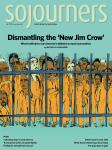IN 2006, A MAJORITY of Michigan voters amended their state constitution to outlaw the use of race in college admissions. Supporters of affirmative action challenged that amendment in court; in April, the U.S. Supreme Court (in a case known as Schuette vs. Coalition to Defend Affirmative Action) affirmed Michigan’s right to ban the use of affirmative action by public universities.
Justice Sonya Sotomayor issued a 58-page dissent with a blistering critique of the court’s ruling. Sotomayor pointed out the illogic of the majority opinion that the case was about the voters’ right to self-governance. “This case,” she wrote, “is about how the debate over the use of race-sensitive admissions policies may be resolved ... that is, it must be resolved in constitutionally permissible ways.”
Sotomayor explained in her dissent that “by permitting a majority of the voters in Michigan to do what our Constitution forbids, the Court ends the debate over race-sensitive admissions policies in Michigan in a manner that contravenes constitutional protections long recognized in our precedents.” In other words, if we allow the majority to rule without limits, then affirmative action is effectively dead.
Prior to the 2006 vote, admissions policies were governed by institutions’ own governing boards. Citizens could influence admissions policy by utilizing the mechanisms within the political structure of the board, by lobbying board members, or voting them in or out in statewide elections. The 2006 vote changed the structure of Michigan politics.
University alumni could still lobby for policies that favor their legacy students. Parents of athletes or students in a particular area of study could still lobby board members directly to alter policies in their favor. But parents of minority students were banned from utilizing the same mechanisms for their children.
Andrew Cohen of the Brennan Center for Justice notes a connection between the Schuette ruling and Shelby County (Ala.) vs. Holder, which hobbled the preclearance provision of the Voting Rights Act last year. According to Cohen, the two rulings are “different sides of the same coin.” The Shelby County decision told Southern legislators they could change voting procedures to make it harder for minorities to exercise their right to vote. Schuette tells voters they can restrict procedural remedies for minority students and by extension minority communities. “In each case,” Cohen argued, “the Court sought to somehow extract race out of racial problems.”
Therein lies the rub: Schuette and Shelby strike at the heart of what it means to be American.
The Fourteen Amendment declares, “No state shall make or enforce any law which shall abridge the privileges or immunities of citizens of the United States ... nor deny to any person within its jurisdiction the equal protection of the laws.” Yet both recent rulings allow states to pass laws that intentionally (or unintentionally) abridge the privileges of minorities, thereby denying equal protection of the law.
But Schuette and Shelby are not only un-American, they are un-Christian. To deny equal protection is to look into the face of minorities and deny equal possession of the image of God. What’s more, these particular rulings allow majorities to deny minorities the equal capacity to self-govern—to exercise dominion.
Justice Sotomayor warned, “I firmly believe that our role as judges includes policing the process of self-government and stepping in when necessary to secure the constitutional guarantee of equal protection.”
As Christians, our role is to stand with those on the margins, to bear witness to the image of God within them, and, sometimes, to say no to the will of the majority for the sake of Christ’s common good.

Got something to say about what you're reading? We value your feedback!
